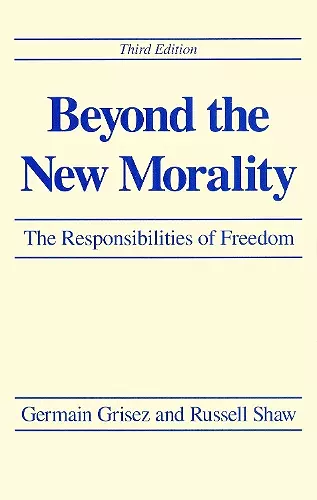Beyond the New Morality
The Responsibilities of Freedom, Third Edition
Russell Shaw author Germain Grisez author
Format:Paperback
Publisher:University of Notre Dame Press
Published:30th Sep '88
Currently unavailable, and unfortunately no date known when it will be back

First published in 1974, with a second, revised edition in 1980, Beyond the New Morality, third edition, retains the best elements of the earlier versions, including the authors' clear, straightforward presentation and use of nontechnical language. Although the basic approach, content, and organization remain substantially the same, the new edition does develop and amend some aspects of the theory. For example, the community dimension of morality is brought out more clearly and the first principle of morality is now formulated more accurately in terms of willing in line with integral human fulfillment.
We are proposing an ethics. But what is ethics? As we use the word, it means a philosophical study of morality, of the foundations on which morality is based, and of the practical implications of a systematic moral outlook. We believe ethics must start by clarifying the fundamental notions of freedom, action, and community. Then it can go on to examine the question "What is the ultimate distinction between moral good and moral evil, between action which is right and action which is wrong?" An answer becomes useful in practice, however, only after one has worked out a satisfactory way of thinking through concrete moral issues—"Should I do this or that?" Thus we next turn to the problem of establishing basic moral principles. Finally, once one is in a position to take a reasoned view of moral issues, it is possible to ask and try to answer the question "To what extent can I close the gap, in my life and in society, between the way I think things ought to be and the way they are?"
History studies human actions, but it looks at particular actions which have actually taken place; ethics is concerned with human action in general or with possible kinds of actions. Psychology and the social sciences also have somewhat the same subject matter as ethics, but they arc mainly concerned with how human beings actually do act and societies actually do work; ethics concentrates on how persons ought to act and societies ought to be formed and reformed.
"Interesting, informative, and challenging." —National Catholic Reporter
"The authors are critical of recent directions in ethics that have departed from the natural law tradition and its emphasis on absolute moral values. Their restatement of the chief positions of traditional ethics is well reasoned and clearly presented. The focus of the book is upon issues of freedom, moral good and evil, ethical systems, and the role of religion in ethical decision." —Religious Resources
“Beyond the New Morality will impress many. . . . [It's] serious reading for the scholarly who want to keep up with the latest.” —The Priest
“Grisez is a highly regarded Catholic moral philosopher. Shaw has a similar reputation as a Catholic writer and public affairs expert. The authors deftly and firmly refute all systems such as consequentialism, proportionalism, and situationalism which imply that moral truths aren’t meant to teach man how to behave. . . . This text has many merits.” —National Catholic Register
ISBN: 9780268006792
Dimensions: 216mm x 140mm x 14mm
Weight: 319g
272 pages
3rd edition